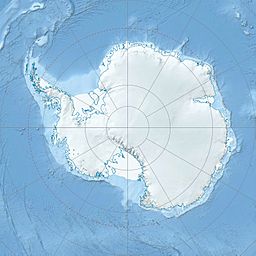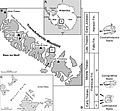Mount Kirkpatrick facts for kids
Quick facts for kids Mount Kirkpatrick |
|
|---|---|
| Highest point | |
| Elevation | 4,528 m (14,856 ft) |
| Prominence | 2,601 m (8,533 ft) |
| Listing | Ultra |
| Geography | |
| Location | Antarctica |
| Parent range | Queen Alexandra Range |
Mount Kirkpatrick is a very tall mountain in Antarctica. It's mostly free of ice, which is unusual for a place like Antarctica! This mountain is part of the Queen Alexandra Range.
It stands 8 kilometers (5 miles) west of Mount Dickerson. Mount Kirkpatrick is the highest peak in the Queen Alexandra Range. It's also the tallest point in the larger Transantarctic Mountains.
A group called the British Antarctic Expedition found and named the mountain in 1907–09. They named it after a businessman from Glasgow who helped fund their trip. Sometimes, people also call it Mount Kilpatrick.
Contents
Mount Kirkpatrick: A Dinosaur Discovery Site
Mount Kirkpatrick is home to one of the most important places for finding fossils in Antarctica. This special spot is called the Hanson Formation.
Long ago, Antarctica was much warmer than it is today. It had thick forests of conifer trees and cycad plants. Also, all the continents used to be joined together in one giant supercontinent called Pangaea.
Because of this, many ancient animals found in Antarctica have relatives in other parts of the world.
Ancient Animals Found Here
Scientists have found fossils of many interesting creatures at Mount Kirkpatrick.
- Tritylodonts: These were plant-eating, mammal-like reptiles. They were common in many places around the world during that time.
- Pterosaurs: A fossil of a crow-sized pterosaur (a flying reptile) was also found.
- Dinosaurs: Many dinosaur remains have been uncovered!
Dinosaurs of Mount Kirkpatrick
Fossils of dinosaurs that looked like Plateosaurus, Coelophysis, and Dilophosaurus were dug up here.
Mount Kirkpatrick is famous for the first dinosaur scientifically named from Antarctica. This was a large meat-eating dinosaur called Cryolophosaurus.
In 2004, scientists even found parts of a huge plant-eating dinosaur. This was a sauropod, known for its long neck and tail.
Another plant-eating dinosaur, Glacialisaurus hammeri, was identified from fossils on Mount Kirkpatrick in 2007. This dinosaur was thought to be about 7.6 meters (25 feet) long. It may have weighed 4 to 6 tons. Mount Kirkpatrick is the only known place where Glacialisaurus hammeri fossils have been found.
Images for kids
See also
 In Spanish: Monte Kirkpatrick para niños
In Spanish: Monte Kirkpatrick para niños
 | Anna J. Cooper |
 | Mary McLeod Bethune |
 | Lillie Mae Bradford |



